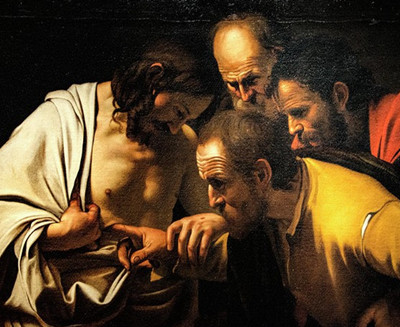Faith in the resurrection of Jesus was slow in coming even for His closest friends and followers. There were the special, fleeting moments when they saw Him again, heard Him speak, even ate fish with Him on the shore, which allowed them to become aware of His presence and power in ways that transcend the senses. But there were those who always needed, in some way, to touch the wounds of the Risen Christ or demand some physical proof in order to believe .
 Today's resurrection narrative is one of those stories proclaimed to help us come to a deeper faith. It begins with a single word: "Shalom" – a word of peace to a dispersed and frightened band of disciples. As the story unfolds, we see the demand of Thomas for proof. We see the invitation to touch His wounds. But, most importantly, we hear that same challenge to believe without seeing. "Blest are they who have not seen and have believed."
Today's resurrection narrative is one of those stories proclaimed to help us come to a deeper faith. It begins with a single word: "Shalom" – a word of peace to a dispersed and frightened band of disciples. As the story unfolds, we see the demand of Thomas for proof. We see the invitation to touch His wounds. But, most importantly, we hear that same challenge to believe without seeing. "Blest are they who have not seen and have believed."
After the Crucifixon the disciples gathered together, partly in fear and wonder, and partly because they needed each other's support. When Jesus appeared to them, He offered them His gift of peace, and urged them to make mutual forgiveness the very first sign of their faith in the resurrection.
The Gospel tells us that Thomas was not with the others when Jesus first came to them after the Resurrection. The fact that the surviving members of the Twelve seem to have been paralyzed into inaction and are hiding together in a locked room makes us wonder where Thomas actually was. We can be certain that he must have felt totally alone. Not even the fellowship of his companions brought him comfort. Not only does he refuse to believe what they tell him, but he issues an ultimatum, indirectly aimed at Jesus. Maybe he wanted Jesus to know how angry he was and how empty he was feeling. Perhaps he was hurting so much that he just couldn't bring himself to believe that Jesus would dare return to the group in his absence.
It doesn't really matter. What does matter is that when Jesus finally confronts Thomas, gently challenging him to follow through with his ultimatum, Thomas finds that there is no longer a need for that. He drops to his knees and makes the simplest and yet most profound act of faith recorded in the whole of the New Testament: "My Lord and My God!"
Faith must go beyond just seeing and touching with our physical senses. Thomas is a reminder today that our journey of faith includes doubt and brokenness. Jesus was identifiable to the disciples through his wounds, not in spite of them. It is through these same wounds that we receive our life. Our wounds – whatever they might be - do not set us apart from Jesus. Rather, they are signs of our union with him. And his wounds promise that we will never be defeated by anything that assails us.
And because of this promise, our mission to proclaim the good news of salvation to all becomes just a little easier. We can heal the broken-hearted because we first have felt the healing power of Christ in our lives. We can forgive those who have sinned against us and against the world, because we first have been forgiven. We can enable others to experience the presence of Christ in their lives, because we first have been found by Him, we are known to him and we have been loved by Him in ways that we could never imagine. We can become Christ’s light to the world, knowing full well that even the smallest and most insignificant of flames is far more powerful than the darkness itself.
Graphic: 'The Incredulity of St.Thomas' by Caravaggio ca.1601, at the Neues Palais, Potsdam





